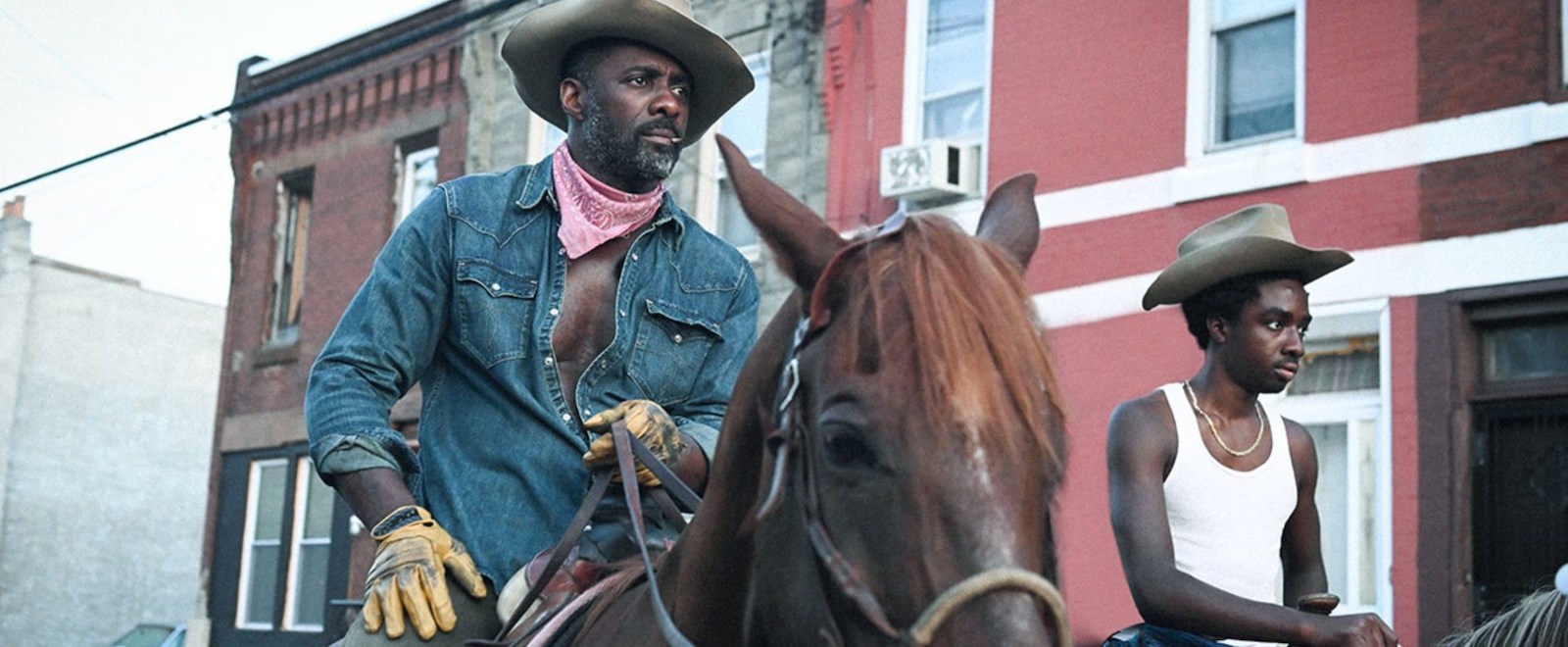Concrete Cowboy, which premiered at the Toronto Film Festival, falls into that category of movie where the subject matter is so interesting I just want to know more. In this case – and we’ve seen examples during the protests over the last few months – Black cowboys in the middle of large cities. It’s something, admittedly, I just didn’t know much about and the site of people riding horses in heavily populated urban areas seems unusual, but it has a long history and Ricky Staub’s Concrete Cowboy does a good job of filling in that history.
Based in part on the book Ghetto Cowboy by Greg Neri, Cole (Caleb McLaughlin, who you probably know best from Stranger Things) is headed down a bleak path after one too many run-ins with trouble and the police. His mother, at her wits’ end, decides Cole should spend the summer in Philadelphia with his father, Harp (Idris Elba). Harp is part of a local group, the Fletcher Street Urban Riding Club, who own and tend horses in Philadelphia. (Many of the actual members of Fletcher Street Riding Club appear in the film to varying, understandable degrees of acting talent that range from, “well, that’s nice they are in this,” to, “oh, I would have bet money that was an actor.”)
The plot of Concrete Cowboy itself doesn’t offer a ton of surprises, and it probably plays out a lot like you think it will. Cole still winds up finding trouble in Philadelphia. Idris Elba’s Harp takes the tough love approach, demanding Cole stop hanging out with certain friends. Then, later, he encourages him to start taking care of the horses in the stables and learn some responsibility. When one of the horses escapes to a local softball field – with a couple of dozen very surprised white, softball playing city-dwellers standing around, not knowing quite what to do – it’s Cole who approaches the scared and feisty animal to bring it back.
So, yes, it’s a movie about a somewhat estranged father reconnecting with his son over their eventual shared love of the horses. A particular scene stood out, as members of the urban horse riding community are all hanging out in a city field, drinking beers and sharing tales of the past. This is also when we meet Leroy (Method Man), a local sheriff who is very much a part of the local community. And his character just underscores how important it is for members of the police to actually know and live in the community they serve – a point that comes into play later in the film. But it’s during this scene that we hear about the history of the Black cowboy and how Hollywood erased their legacy. That even the Lone Ranger was a Black man (Bass Reeves), but as we know became a white guy in hundreds of radio and television installments. But it’s this legacy of the Black cowboy that’s still alive today with these urban cowboy clubs.
Concrete Cowboy is a nice movie about fathers and sons and humanity and the legacy of why there are people riding horses in places you wouldn’t expect to see any horses. In fact, there should probably be more horses in cities. “Less cars, more horses” sounds like a pretty good campaign slogan. During the credits, the real-life members of the club share their personal stories about how the riding club changed their lives. One man can’t walk anymore, but he can still ride. (In the movie his character says this happened during an altercation over a street corner, a street corner that now hosts a Starbucks. “I’ll be in a wheelchair the rest of my life, all for nothing,” he says. I can only assume this story he tells in the movie is a true story.)
A movie like Concrete Cowboy seems to fit the theme of this particular Toronto Film Festival. It’s a movie that, probably, would get swallowed up a bit by all the usual huge films. But this year, thankfully, it’s getting some nice attention. And it’s further proof that, even in this virtual form, it’s a great thing that film festivals continued to push forward as best they could.
You can contact Mike Ryan directly on Twitter.







